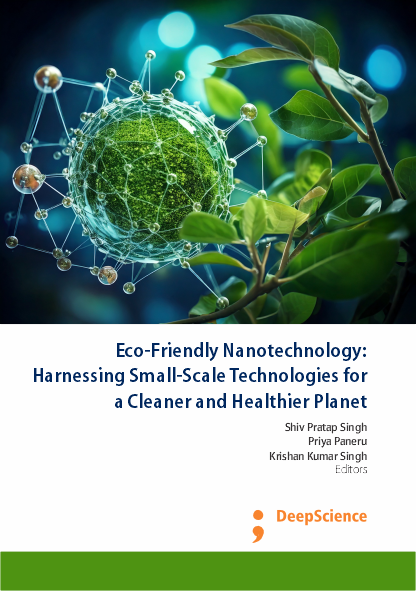Eco-Friendly Nanotechnology: Harnessing Small-Scale Technologies for a Cleaner and Healthier Planet
Keywords:
Green nanotechnology, Eco-friendly nanomaterials, Sustainable nanotechnology, Biogenic nanoparticles, Bio-based nanomaterials, Biodegradable nanomaterials, Agriculture, Environment, NanosensorsSynopsis
Rapid breakthroughs in nanotechnology have changed various scientific areas, giving fresh solutions to global challenges. However, the environmental and health threats related with traditional nanomaterials have enforced a move to more sustainable approaches. “Eco-Friendly Nanotechnology: Harnessing Small-Scale Technologies for a Cleaner and Healthier Planet” analyses this evolving paradigm, focusing eco-friendly synthesis, applications, and nanotechnology's potential to support environmental sustainability. This book aims to provide a comprehensive exploration of how nanotechnology, when applied with an eco-conscious mindset, can drive innovation while minimizing adverse environmental impacts.
This book delves into the principles of green chemistry and nanotechnology, exploring how renewable resources, non-toxic materials, and energy-efficient techniques can be utilized to create nanomaterials with minimal environmental impact. It also analyses the role of green nanotechnology in a variety of areas, including medical, agricultural, energy, and water purification, highlighting existing applications and future opportunities. However, its unchecked expansion raises concerns regarding toxicity, waste management, and ecological footprint. Green nanotechnology seeks to harmonize scientific advancements with sustainability by designing safer nanomaterials, optimizing resource efficiency, and reducing hazardous byproducts. This book delves into these critical aspects, offering insights into cutting-edge research, novel applications, and ethical considerations. Throughout the chapters, we examine the principles guiding green nanotechnology, explore sustainable synthesis methods, and discuss its implications for energy, water purification, agriculture, and medicine. Special attention is given to policy frameworks and regulatory approaches essential for fostering responsible development and commercialization of nanotechnologies.
This book, intended for academics, engineers, policymakers, students, and professionals, provides a comprehensive introduction to the sustainable integration of nanotechnology into science and industry. By implementing green nanotechnology, we can effort to fulfil the gap between innovation and environmental stewardship, paving the way for a cleaner, safer, and more sustainable future. Whether you are an academic exploring the theoretical foundations or an industry professional seeking practical application, this book aims to serve as a valuable resource. By fostering a deeper understanding of green nanotechnology, we hope to inspire innovation that aligns with environmental stewardship and societal well-being.
We hope that this book will encourage readers to contribute to the advancement of green nanotechnology and its good impact on the world. Through responsible innovation, we can harness the power of nanotechnology to build a cleaner, healthier, and more sustainable future for generations to come.
Chapters
-
Fundamental principles of green nanotechnology in agriculture
-
Development and application of eco-friendly nanomaterials in plant science for sustainable agriculture
-
Nano-engineered fertilizers: Enhancing plant nutritional dynamics through precision delivery
-
Nanotechnology as a paradigm-shifting modality in contemporary agricultural systems
-
Nano-enabled Phytopriming: A biotechnological avenue for enhanced germination and abiotic stress mitigation
-
Nano-formulated pesticidal constructs: Eco-conscious strategies for Phytopathogenic containment
-
Application of nanotechnology in soil remediation and water management
-
Endophytic fungi-derived nanoparticles: A sustainable way to alleviate biotic and abiotic stress in plants
-
Biosynthesized nanoparticles from endophytic bacteria: A game-changer for stress-resilient crops
-
Integration of genetic engineering and nanoscale technologies for innovative phytobiological modulation
-
Nanomaterials in enhancing photosynthetic efficiency and metabolic homeostasis in plants
-
Risk-benefit dynamics of nano-enabled technologies in sustainable agroecosystems
-
Regulatory frameworks and biosafety protocols of nanomaterials in agro-based applications
-
Nanotechnological approaches for enhancing climate resilience and sustainable adaptation in agriculture
-
Prospective trajectories in nano-enabled sustainable agronomy and ecological resilience













